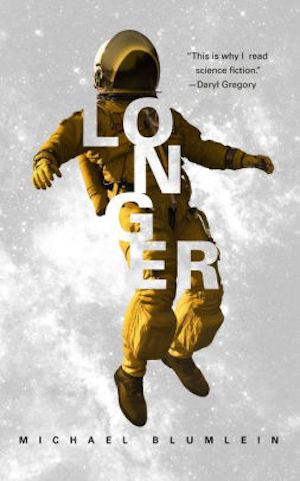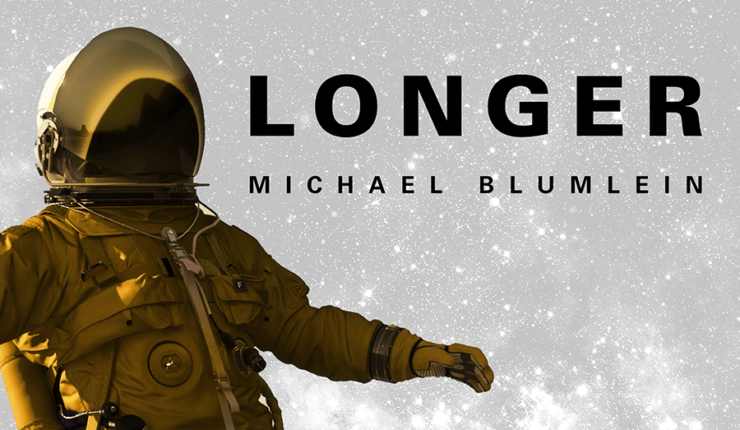Some fiction explores the known; other fiction delves into the unknown. Michael Blumlein’s fiction takes another route altogether, revealing the unknown and the mysterious in some of the most nominally familiar places out there. It’s something that makes his work simultaneously revelatory and disconcerting: like a host of authors in the speculative realm, he concerns himself with myriad forms of alienation, but Blumlein’s take on these themes is distinctive and unique.
Blumlein frequently explores questions of gender and the human body in his work. The narrator of his acclaimed story “The Brains of Rats” ponders his own relationship to gender and, more broadly, whether or not to move forward with a plan that would forever shift humanity’s gender balance. His 1993 novel X, Y may be about a man and women who swap bodies, or about a woman experiencing a particularly dramatic psychological breakdown, or about something even stranger. Blumlein’s background is in medicine—the author’s biography at the end of Longer notes that he recently retired from the University of California at San Francisco—and that lends his work an academic authority that meshes memorably with his exploration of grey areas.
At first glance, Longer is more archetypally science fictional than the other examples of his work that I’ve cited. It’s a married pair of scientists, Gunjita and Cav, whose work takes them into close proximity of an object on an asteroid that may or may not be extraterrestrial. But while that might in and of itself be enough to fuel a philosophical exploration of the nature of life and consciousness, that’s not really what Blumlein is after here.
Instead, Longer is a book about mortality. The central concept around which this book revolves—and which serves as a source of tension between Gunjita and Cav—is that humanity has discovered a process by which people can be de-aged. (“Juved,” in this society’s parlance.) This hasn’t resulted in immortality, however: the process only works twice. When the novel opens, Gunjita has juved twice, while her husband hasn’t yet opted to undergo the process a second time—prompting a host of questions of mortality, ethics, and intimacy.
About that rejuvenation process: the results of a third go-round are ominous, to say the least. Laura Gleem, the wealthy corporate head whose company employs Gunjita and Cav, hasn’t been seen in public since attempting a third rejuvenation, adding a hint of mystery to the proceedings: Was it lethal to her? Has it altered her body in some fundamental way? Gunjita and Cav are at work on finding a means by which juving can take place three or more times, with all of the unruly questions that that implies left hovering around them.
Buy the Book


Longer
Blumlein has conjoined two archetypal science fiction narratives here: one of post-humanism, including both potential immortality and the bodily upgrades that another character has received, and one of first contact. But neither one announces itself as such: the bizarre object that may be extraterrestrial might also be too alien to be recognized as a life form or a product of technology. This isn’t a novel where science is guaranteed to have a massive breakthrough; instead, it’s a case study of trial and error, and one where even the most rigorous research might not arrive at anything conclusive.
In Longer, the small details are what elevate the narrative. Blumlein occasionally annotates the narrative: at one point early on, Gunjita quotes a poem that Cav had written long ago. The footnote provides a wealth of information on Cav’s foray into verse, but also illustrates the limits of memory. “Gunjita is actually misquoting him slightly,” Blumlein writes—an omniscient observation that humanizes these characters even more.
Though the narrative of Longer is taut, Blumlein also throws in some small details that hint at fascinating aspects of this fictional future. Laura Gleem’s narrative is one of them; the glimpses of Gunjita and Cav’s pasts are another. A past event, the Hoax—“aka the Great Hoax. Also, the Floater Hoax,” via a footnote—is alluded to just enough to create a sense of mystery and tension. So too is a mention that, after juving, “[g]ender, in particular, was prone to shift and recalibrate, as all things essentially fluid to begin with did.” For all that the human psychology is recognizable in this story, particularly Cav’s questions regarding his own mortality, Blumlein also constantly reminds the reader that this society is a fundamentally different one from our own. In telling a story intimate in scope, Blumlein doesn’t neglect larger questions of societal change—and in doing so, he creates a thoughtful meditation on the ways technology can address pressing philosophical questions, and where it might reach its limits.
Longer is available from Tor.com Publishing.
 Tobias Carroll is the managing editor of Vol.1 Brooklyn. He is the author of the short story collection Transitory (Civil Coping Mechanisms) and the novel Reel (Rare Bird Books).
Tobias Carroll is the managing editor of Vol.1 Brooklyn. He is the author of the short story collection Transitory (Civil Coping Mechanisms) and the novel Reel (Rare Bird Books).










